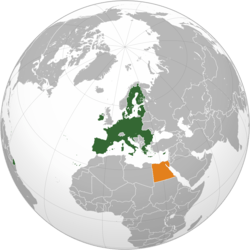Egypt–European Union relations
The Egypt–European Union relations are the multilateral relations between the Arab Republic of Egypt and the European Union (EU). Both sides share a common membership in the Union for the Mediterranean.
 | |
EU |
Egypt |
|---|---|
Under the aegis of the Global Mediterranean Policy (GMP) launched in 1972, an agreement between the European Economic Community and Egypt was signed in January 1977.[1] The framework laid out by the 1995 Euro-Mediterranean Partnership paved the way for some modest advances in the EU–Egypt relations,[2] leading to a new association agreement signed on 25 June 2001 in the context of the Barcelona process, that entered into force in June 2004.[3] An EU–Egypt Action Plan also entered into force in 2007.[2] The outbreak of the Arab Spring defied the traditional stability-driven policy conducted by the EU in the region, conveyed by the support to authoritarian rulers in office, including Egypt's Hosni Mubarak, eventually leading to a reassessment of the EU foreign policy in the region.[4]
References
- Citations
- Zank 2010, p. 149.
- Bordón 2019, p. 330.
- Zank 2010, p. 152.
- Abdel Ghafar & Jacobs 2019, pp. 1–2.
- Bibliography
- Abdel Ghafar, Adel; Jacobs, Anna (2019). "EU–North Africa Relations in an Age of Turbulence". In Abdel Ghafar, Adel (ed.). The European Union and North Africa: Prospects and Challenges. Washington, D.C.: Brookings Institution Press. ISBN 9780815736967.CS1 maint: ref=harv (link)
- Bordón, Javier (2019). "The European Union and the Egyptian Neighbour: assessing the characterization of resilience as an external action priority" (PDF) (7). Paix et sécurité internationales: Journal of International Law and International Relations: 323–348. ISSN 2341-0868. Cite journal requires
|journal=(help) - Zank, Wolfang (2010). "Cooperation or Silent Rivalry? The EU and the USA in the Mediterranean – The Case of Egypt" (PDF). Perspectives on Federalism. 2 (3). ISSN 2036-5438.CS1 maint: ref=harv (link)

.svg.png)